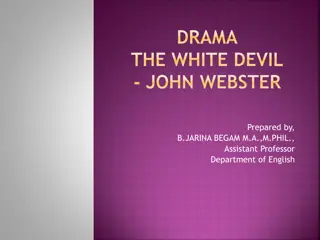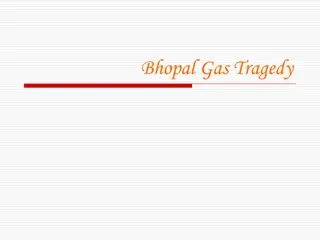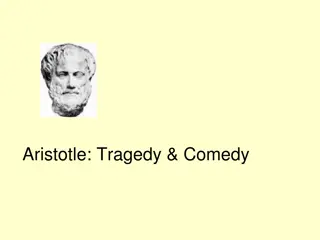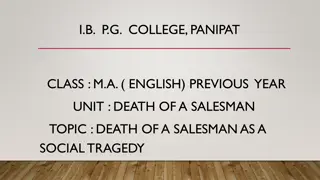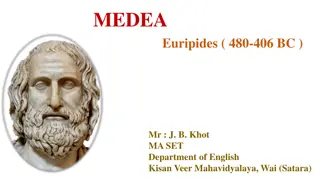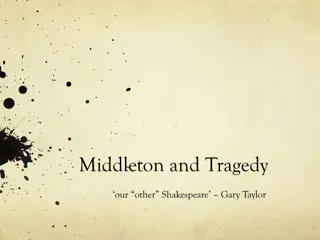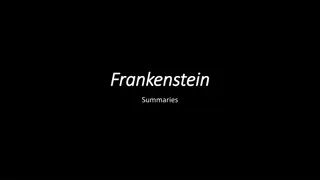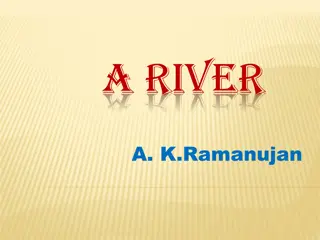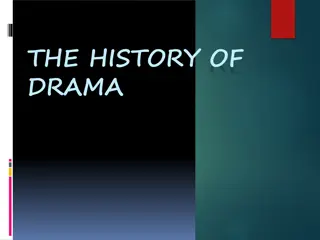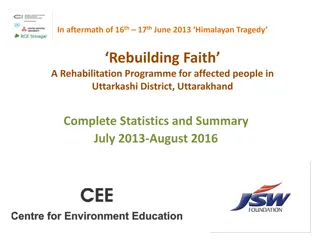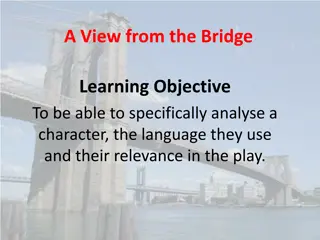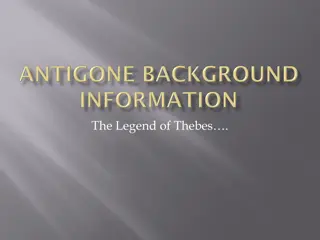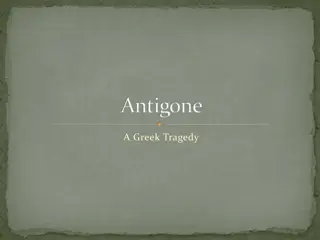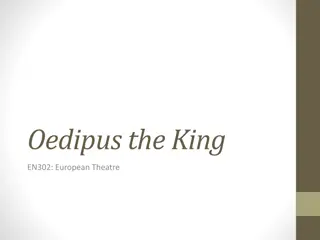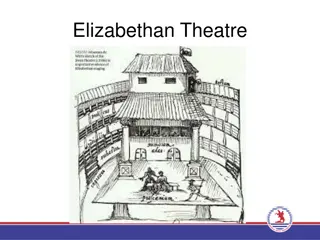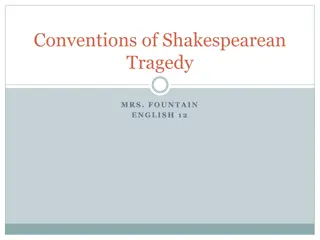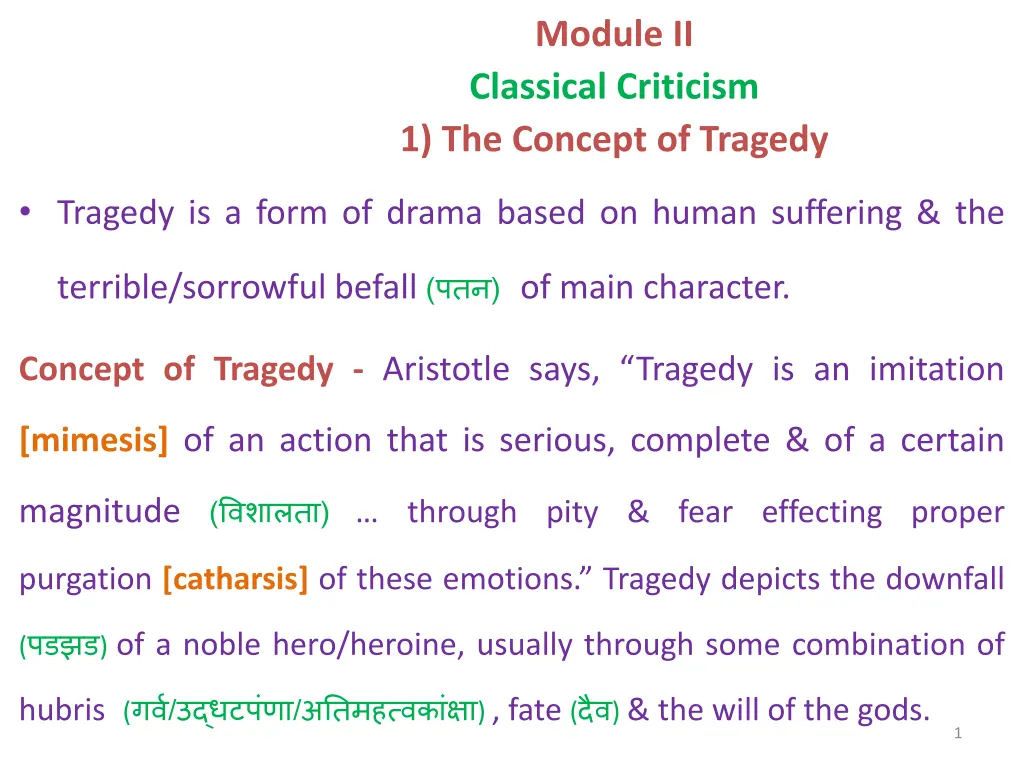
Tragedy in Classical Drama: Aristotle's Concept
Explore Aristotle's concept of tragedy in classical drama, focusing on the downfall of noble heroes, the importance of plot, and the elements that make a tragedy impactful. Discover how tragic heroes confront their flaws and fate to achieve catharsis through pity and fear.
Download Presentation

Please find below an Image/Link to download the presentation.
The content on the website is provided AS IS for your information and personal use only. It may not be sold, licensed, or shared on other websites without obtaining consent from the author. If you encounter any issues during the download, it is possible that the publisher has removed the file from their server.
You are allowed to download the files provided on this website for personal or commercial use, subject to the condition that they are used lawfully. All files are the property of their respective owners.
The content on the website is provided AS IS for your information and personal use only. It may not be sold, licensed, or shared on other websites without obtaining consent from the author.
E N D
Presentation Transcript
Module II Classical Criticism 1) The Concept of Tragedy Tragedy is a form of drama based on human suffering & the terrible/sorrowful befall ( ) of main character. Concept of Tragedy - Aristotle says, Tragedy is an imitation [mimesis] of an action that is serious, complete & of a certain ( ) through pity & fear effecting proper magnitude purgation [catharsis] of these emotions. Tragedy depicts the downfall ( ) of a noble hero/heroine, usually through some combination of hubris ( / / ), fate ( )& the will of the gods. 1
Tragic hero's powerful wish to achieve some goal inevitably encounters limits. Aristotle says that tragic hero should have a flaw/make some mistake (hamartia). Hero need not die at the end, but he/she must undergo a change in fortune. There are 4 distinct kinds of tragedy - 1) Complex Tragedy 2) Tragedy of Suffering 3) Tragedy of Character 4) Tragedy of Spectacle Aristotle distinguished 6 elements of tragedy - plot, characters, verbal expression, thought, visual adornment & song-composition. Of these, PLOT is most important. 2
o Tragic hero achieve recognition about human fate, destiny & will of gods, Aristotle s definition of Tragedy from Poetics, Tragedy is a process of imitating an action with serious implications, is complete & possesses magnitude, by sensuously attractive language, with parts, enacted by persons themselves & not presented through narrative, through a course of pity & fear completing purification catharsis , sometimes translated purgation of such emotions. a) "imitation" (mimesis) : Contrary to Plato, Aristotle asserts that artist does not just copy the world, but imitates/represents Reality itself & gives form & meaning to that Reality. 3
In so doing, artist gives shape to the universal, not accidental. b) "an action with serious implications": serious because it raises & purifies pity & fear; serious in a moral, psychological & social sense. c) "complete & possesses magnitude": not just a series of episodes, but a whole with a beginning, a middle & an end. Idea of imitation is important as the artist does not just slavishly copy everything related to an action, but selects/represents only those aspects which give form to universal truths. d) "language sensuously attractive...in the parts": language must be appropriate for each part of the play: choruses are in a different 4
meter & rhythm & more melodious than spoken parts. e) tragedy relies on an enactment (dramatic performance), not on "narrative . f) "purification" (catharsis) : tragedy first raises (it does not create) the emotions of pity & fear, then purifies/purges them. Tragic hero is a great man who is neither a paragon ( / ) of virtue & justice nor undergoes the change to misfortune through any real badness/wickedness but because of some mistake." A great man: one of those who stand in great repute & prosperity, like Oedipus & Thyestes: conspicuous ( ) men from families of that kind. 5
Hero is neither a villain nor a model of perfection but is good & decent. a) mistake (hamartia) : This Greek word, which Aristotle uses only once in the Poetics, has also been translated as flaw/error . b) Great man falls through--though not entirely because of some weakness of character, some moral blindness/error. Best tragic plot is single & complex, rather than double (with opposite endings for good & bad - a characteristic of comedy in which the good are rewarded & wicked punished). All plots have some pathos (suffering), but a complex plot includes reversal & recognition) "reversal" (peripeteia): occurs when a situation seems to developing in one direction, then suddenly XXX 00 XXX "reverses" to another. 6

